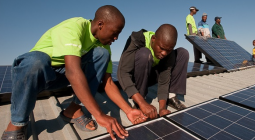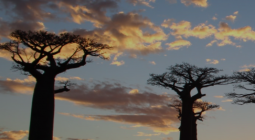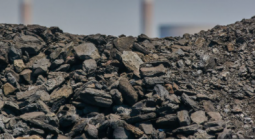‘It will save the world’: Put Africa at heart of climate fightback, Cop26 told
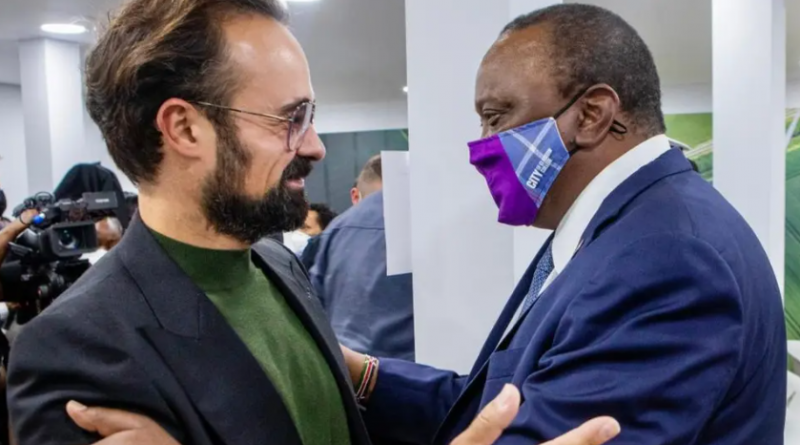
Event co-staged by The Independent hears that protecting the continent’s carbon-rich landscapes is vital
The battle against climate change can only be won if Africa’s carbon-rich landscapes are protected for future generations, delegates at the Cop26 climate summit were told on Wednesday at an event co-staged by The Independent.
The session at the Glasgow summit was convened by Lord Lebedev, shareholder of The Independent, and the Kenyan president Uhuru Kenyatta.
Attendees were told by leading African politicians, including Gabon’s climate-change minister and Uganda’s and Rwanda’s ministers of environment, how protecting Africa’s carbon-rich landscapes must be at the heart of the global climate fight – and in a way that works for the people of Africa.
Halting deforestation, particularly in carbon-rich, tropical forests, has emerged as a key theme at Cop26.
On Tuesday more than 110 leaders – representing 85 per cent of the planet’s forests – signed a declaration committing to halt and reverse deforestation by 2030.
Wednesday’s event at the African Development Bank’s Cop26 pavilion, which was co-staged with the conservation charity Space for Giants under its Giants Club initiative, was to draw attention to the value of Africa’s carbon sinks and launch an initiative to fast-track the development of their offset sectors across the continent via national investment processes.
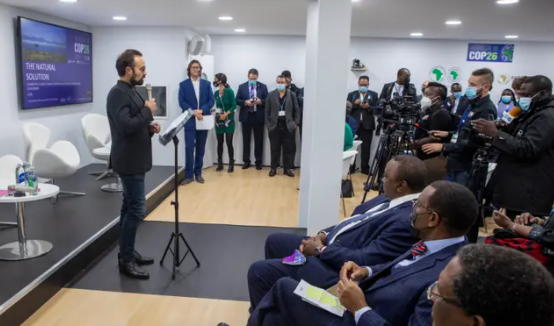
(Katielee Arrowsmith/SWNS)
Evgeny Lebedev told the audience how he had first learned the value of protecting nature as a child during trips with his grandfather, Professor Vladimir Sokolov, a Soviet scientist and environmentalist, on zoological expeditions to Africa.
“Nothing could have been more fascinating to a young boy than seeing all these amazing animals in iconic landscapes,” he said.
He contrasted this with another trip he undertook with his grandfather: this time to Chernobyl, three years after the nuclear meltdown.
“I first realised how much mankind was hurting the planet and themselves as a result,” he said. “Today, the outcomes of humanity’s crimes against the environment are visible to us all.”
It was particularly important to protect crucial ecosystems such as the Congo River Basin, he emphasised.
“Unlike other tropical rainforests, the Congo still remains a strong net-carbon sink. We must not repeat the Amazon’s deforestation catastrophe. We must preserve iconic landscapes helping to sequester carbon.”
President Kenyatta celebrated the work done by Space for Giants’ Giants Club initiative to protect under-threat landscapes. “I want to appreciate the Giants Club for the investment that they have made into that endeavour.”
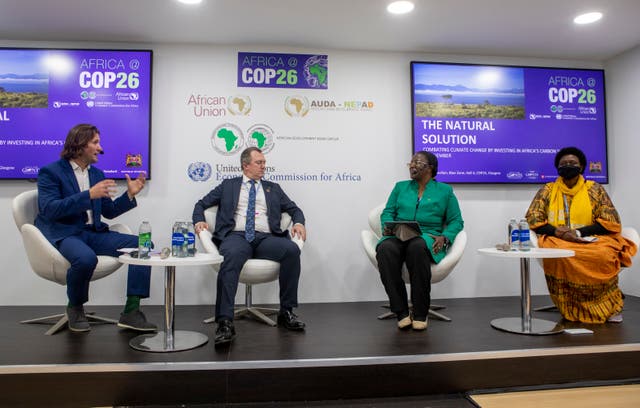
(Katielee Arrowsmith/SWNS)
The Kenyan president is a member of the Giants Club along with the presidents of Botswana, Gabon, Uganda, Mozambique and Rwanda. Evgeny Lebedev is the Giants Club’s patron.
The Kenyan leader noted that the Giants Club now faces its biggest ever problem: halting and reversing the degradation of ecosystems “not only in Africa, but across the globe”.
Africa accounts for roughly 18 per cent of the world’s population, he said, but contributes less than 4 per cent of global emissions.
“Yet it is Africa that will unfortunately bear the biggest brunt of climate-change impacts, with an average of 3C warming, increasing conflicts as a result, and also increased insecurity in our regions,” he told the audience.
“Our forests, our savannahs, our mangroves and swamps, our coral reefs and our marine reserves are the carbon sinks of the world. Indeed, they are the basis of the very oxygen that we breathe every day.
“And yet that great public benefit that the African ecosystem provides to the world has not yet been fully acknowledged; neither is it sufficiently protected; and we have certainly not been compensated for it.”
He noted that Cop26 offered a platform from which to change that trajectory – and that it was being demanded by those at Cop26 but also those “on the margins, and even on the streets of Glasgow and Edinburgh”.
He told the event: “I believe this is our opportunity. We must together create an enabling environment to invest in restoring and protecting the great natural carbon-capture machines that were gifted to us by God and nature.”
The audience, which included those joining The Independent’s live-stream of the event, was addressed by Dr Max Graham, founder and CEO of Space for Giants.
He opened the discussion by speaking of the missed target of $100bn in climate finance that wealthy nations committed to a decade ago to help developing countries adapt to the extreme impacts of global heating.
“The world spends $623bn every year on beer,” he noted, to contextualise the sum.
“We spend $57bn a year on ice cream. And we spend over $100bn a year on coffee.” He then pointed out that the world was spending $5.9 trillion on fossil fuel subsidies annually.
“Does anyone else find it utterly bizarre that collectively, we’re spending more money making our planet uninhabitable than we do protecting our children’s future?” he asked.
The event included Uganda’s minister for the environment Beatrice Anywar; Prof Lee White, the minister for forests, oceans, environment and climate change for Gabon; and Rwanda’s minister of environment, Dr Jeanne d’Arc Mujawamariya.
Speakers from both the conservation and private sectors joined the event, including Dr Akinwumi Adesina, president of the African Development Bank; David Antonioli, CEO of Verra; Wanjira Mathai, vice-president and regional director for Africa at the World Resources Institute; and Peter Bacchus, chair of Bacchus Capital and former global head of mining and metals at Morgan Stanley.
Gabon’s minister Prof White called the Congo Basin the “heart and lungs” of the African continent.
“There’s no 1.5C world without an intact Congo Basin,” he noted. “We lose the Congo Basin, we lose 1.5C, we lose 2C, we lose 3C and we’re heading to a 4C world.”
He said that the important question was how to make forests more valuable when left standing rather than when logged, in a manner that also ensured they became a commodity for local communities in the region.
“Because if the forests are not valuable, the forest will not survive. The forest that does not create jobs does not help us to adapt to the economic cost of climate change,” he said.
“We’re looking at sustainable forestry as a way of maintaining the forests and of giving value to the trees.”
Uganda’s minister arrived directly from Cop26 negotiations to join the discussion, and brought with her a powerful and ultimately uplifting message.
“It is Africa that will save the world from the effects of climate change,” she told the audience. “We have something to offer to the world,” she said of Africa. “We must demonstrate it. We must take charge of the God-given opportunities and resources. We don’t have to live in a rebellious and irresponsible way by destroying the habitats of nature.
“Nature is speaking and we must listen. We have come here to deliver that and it is doable.”
The event was co-staged by The Independent and its sister title the Evening Standard. A recording of the event can be seen on Independent TV.
4 November 2021
INDEPENDENT

